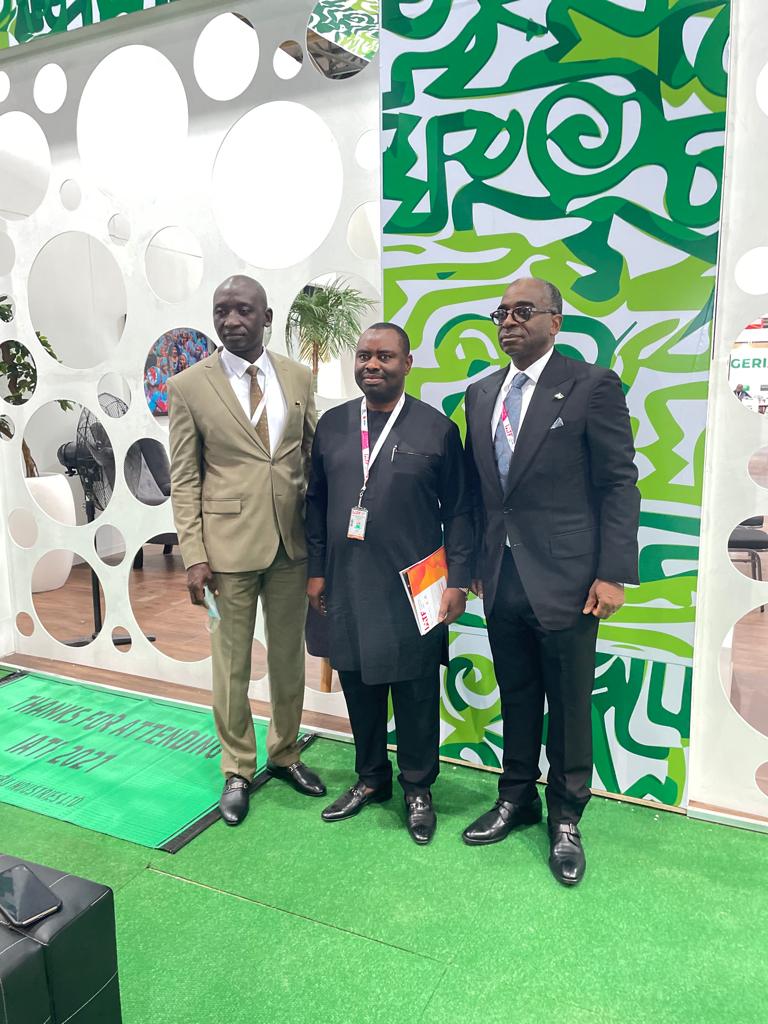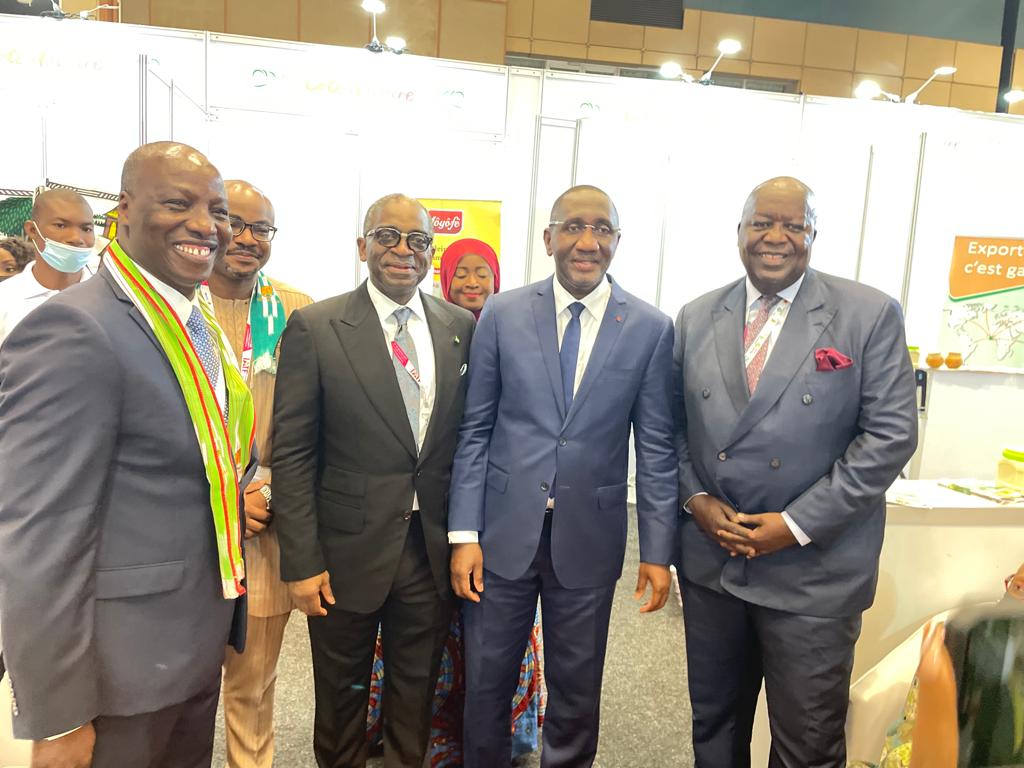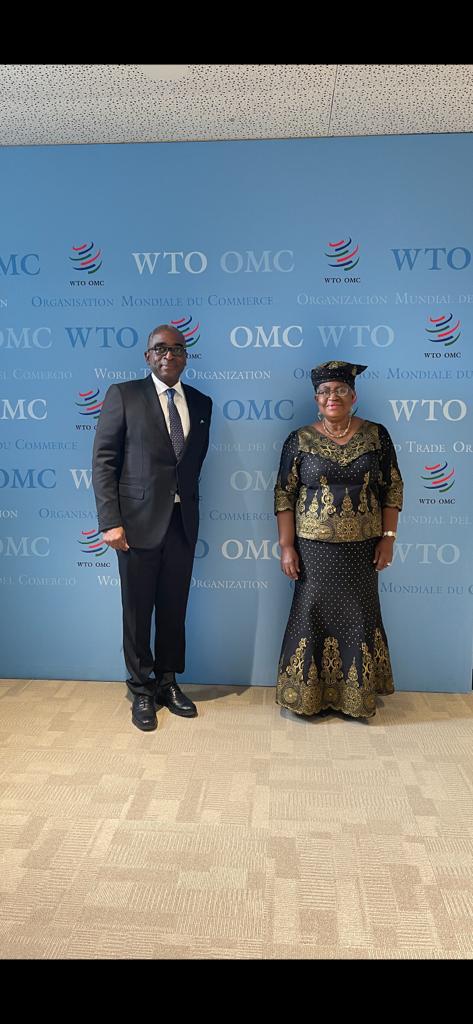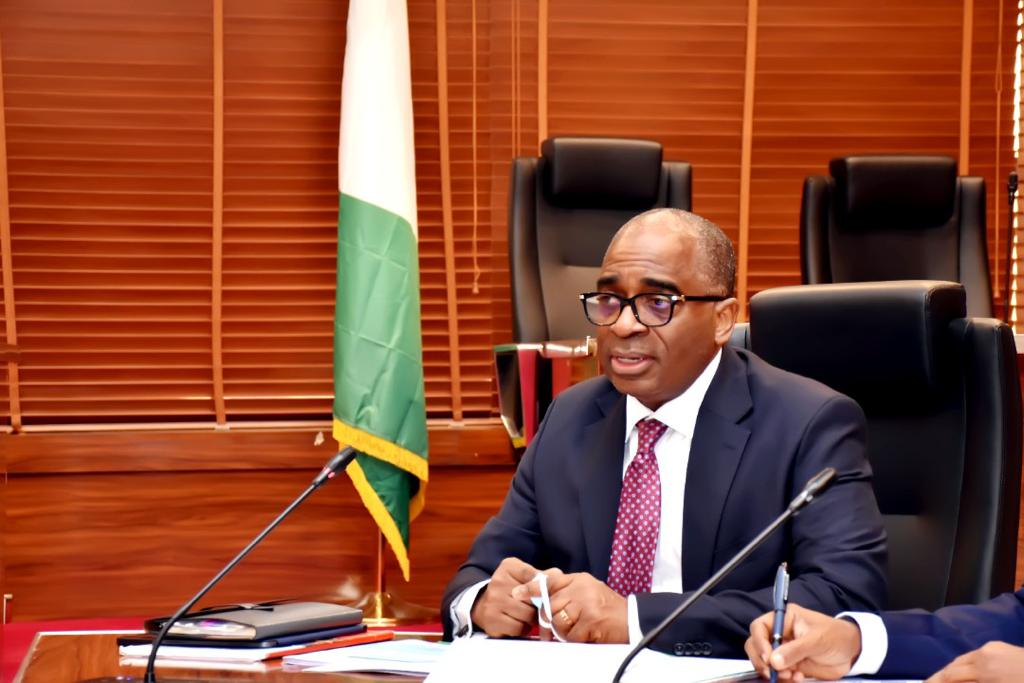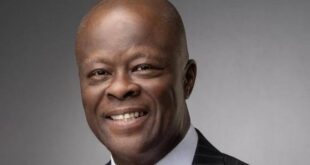Ebuka Daniel
Since the establishment of the Nigerian Export Promotion Council 45 years ago, as the country’s apex institution to promote non-oil exports as the key driver of the Nigerian economy, the period from November 2013 to date unarguably ranks as the most noteworthy, productive, and impactful in the Council’s history.
The NEPC under the leadership of Mr Olusegun Awolowo has demonstrated in practical and measurable terms, more than at any other time before, its institutional potential as a strategic and effective catalyst for export promotion.
Awolowo was appointed at a time when the NEPC had a moribund strategic plan on how to reposition its operations with a view to realizing its mandate – which is diversification of Nigeria’s economy for sustainable economic growth.
But the grandson of the political colossus of the old Western Nigeria was already equipped with the confidence to take on a daunting responsibility on the strength of his exposure to such high flyers as Ngozi Okonjo-Iweala, Nasir El-Rufai, Oby Ezekwesili, Charles Soludo and others in the administration of former President Olusegun Obasanjo.
Before his time at NEPC, he was special assistant to President Obasanjo, who challenged him, instead of “just making noise outside” to “come and see what it is to be inside government.” As special assistant to the president on traditional institutions, Awolowo harped on the idea of briefing the traditional rulers on government programmes. “The exercise was an eye opener…the traditional rulers knew the workings of government and its programmes and intentions,” he recently enthused in fond recollection of his efforts.
He also worked in the president’s office with Oby Ezekwesili in the Budget Monitoring and Price Intelligent Unit (BMPIU known as the Due Process Office), which became the Bureau of Public Procurement (BPP). After President Obasanjo’s tenure, he was a secretary for Social Development at the Ministry of the Federal Capital Territory during the tenure of Aliu Modibbo.
From there, he moved to the Transport Secretariat where he was part of the team that pushed the agenda for the development of the rail system. After Modibbo he worked with Adamu Aliero; then with Bala Mohammed, who assigned him to supervise the Area councils in FCT.
Realising the importance of what an Institutional and Functional Review of the NEPC mandate and operations would do for the success of the Council, Awolowo quickly hit the ground running shortly after his appointment as NEPC Boss by engaging renowned accounting firm KPMG Professional Services to come up with the much-needed framework that would uniquely reposition the Council for the task ahead and indeed for the Chief Executive as well.
Considering the task ahead back then in 2013, the framework was key to the success of the NEPC under the leadership of Awolowo
Awolowo gave credence to this during an interview that “Without the Institutional and Functional Review, we would not have been able to identify need gaps and thereby proffer workable solutions to some of the challenges I met on ground.”
He immediately hit the ground running by embarking on strategic stakeholders’ engagement with all relevant Ministries Departments and Agencies (MDAs), the Organised Private Sector (OPS) and Multi-lateral Organisations such as International Trade Centre, United Nations Industrial Development Organisation (UNIDO), United States Agency for International Development, World Trade Organisation, JETRO and Department for International Development among others.
The engagement was also extended to the State Governments through nationwide consultation with Governors on the need to develop alternative sources of non-oil revenue in order to create wealth and job opportunities.
All these collaborations have led to remarkable operational improvements and performance results from a competent management team with a clarity of focus, determination to succeed, commitment to impact, and a productive mindset.
A LEGACY OF ACHIEVEMENTS:
The Zero Oil Plan And Economic Recovery And Growth Plan
The NEPC under Awolowo developed the Zero Oil Plan in response to the recession in 2016 following the crash in international crude oil prices. The Zero Oil Plan prepared Nigeria for a world in which crude oil is less relevant. The Ministry of Budget and National Planning integrated the Plan as a core component of the Federal Government’s Economic Recovery and Growth Plan (ERGP), which was launched by the President in February 2017.
The Zero Oil Plan is a strategy for boosting foreign exchange through the non-oil sector, mainly through rolling out export policies for 22 major products that could generate up to $30bn in foreign exchange a year.
The 22 products are cotton, rice, leather, gold, soya, sugar, cocoa, petrochemicals, fertiliser, palm oil, rubber, cement, tomato, banana, oranges, cashew, cassava, sesame, spices, ginger, shea butter and cowpea.
Shortly after the implementation of the plan commenced, Nigeria’s non-oil exports rose from $1.17bn billion in 2016 to $3.16bn in 2018 based on figures released by the International Trade Centre.
The plan led to the commencement of export projects and investment tracking in each State as part of the One State One Product scheme. Instructively, the plan also led to the domestic sourcing of products through launch of first National Export Aggregator and also culminated in strengthening of the Export Development Fund (EDF) scheme to enhance competiveness of locally produced goods.
The NEPC boss said, “The zero oil plan has set a long-term goal of earning 20 per cent of Nigeria’s Gross Domestic Product from non-oil exports.
“The initial target, however, is to exceed $30bn in non-oil exports over the next ten years. If properly implemented, the plan will add an extra $150bn minimum to Nigeria’s
foreign reserves cumulatively from non-oil exports over the next ten years.
“The zero-oil plan will create at least 500,000 additional jobs annually, due to an increase in productive and export activities, helping to contribute to Sustainable Development Goals.”
NEPC Technical Support For Promotion Of Nigeria’s Export Products
Under the leadership of Awolowo, the NEPC and the Centre for Promotion of Imports from Developing Countries (CBI) Netherlands have certified 12 selected SMEs for export into the European Union market as part of effort to build capacity for Nigerian exporters for the promotion of non-oil exports and improved access to European Union markets.
Through the programmme, the NEPC provided numerous export support programmes throughout the country for Nigerian exporters. These are programmes were aimed at enhancing product quality (focused on specific sectors). The programmes through capacity building and infrastructural provision, also assisted exporters build and increase competitiveness in international markets.
THE New Export Expansion Grant (EEG) Scheme
Under Awolowo, NEPC got an approval of almost N350bn from President Muhammadu Buhari for incentives through the Export Expansion Grant (EEG).
The EEG is an initiative of the Federal Government that was meant to encourage exporters of non-oil products, including agro-commodities, in order to cushion the effects of infrastructural deficiencies and reduce the overall unit cost of production.
It was introduced through the Export Incentives and Miscellaneous Provisions Act, Cap 118 of 1986, to enhance the contributions of non-oil export to the national economy
The mechanism is such that a financial credit applied to the value of exports of products from Nigeria ranging from five per cent to 30 per cent.
The financial credit is not cash funded but provided as Negotiable Duty Credit Certificate, which can be applied against import duties on other items.
It was suspended by the Federal Government following allegations of abuse of the scheme by exporters.
Awolowo had in 2019 while speaking during a stakeholders’ forum on the framework for the issuance of the promissory notes for the settlement of the outstanding EEG, the government was set to clear the EEG arrears to exporters from 2007 to 2016.
He said the reactivation of the EEG scheme, after its technical suspension in 2014 and settlement of the outstanding claims owed exporters, was in line with the Federal Government’s focus on diversification of the economy through non-oil exports.
He had said, “The assent in January 2019 by the National Assembly of the first batch of the request and the subsequent directives by the Minister of Finance to the Debt Management Office for the settlement of the EEG covering backlogs of ten years for 270 companies with a total value of N195.08bn will bring succour to the export sector.
“We also have a positive signal that the National Assembly will soon pass the second batch of the approval for the remaining 39 companies with a total value of about N126bn only.
“It is our fervent belief that the settlement of this inherited debt by the Federal Government will pave the way for the revival of the non-oil export sector of the economy.
“It will in no small measure enable the affected companies to settle their debts with banks and other financial institutions, inject funds for further export activities, generate more foreign exchange as well as employment for the teeming youth of our country.”
After the EEG was redesigned and reviewed, exporters are now paid with Export Credit Certificate (ECC). The ECC can now be used to settle Federal Government Taxes, purchase of Federal Government Bonds, repayment of Loans or credit facilities advanced by Bank of Industry, NEXIM and CBN intervention facilities.
The New EEG could also be used to settle liabilities arising from transactions with Asset Management Corporation of Nigeria (AMCON).
The Export Development Fund (EDF)
The Export Development Fund (EDF) Scheme was set up by the Federal Government of Nigeria under the Export (Incentives and Miscellaneous provisions) Act CAP E19 Laws of the Federation, 2004 with the objective of providing financial assistance to exporting companies to cover part of their initial expenses with respect to export promotion activities.
The Fund was effectively managed under the leadership of Awolowo as it was used to provide financial assistance to exporting companies to cover part of their initial expenses in respect of export promotion activities. A key feature of the EDF is that it serves as a major incentive to Small and Medium entrepreneurs while a portal to enable prospective applicants access the Fund has been opened.
The promotional activities covered by the EDF include participation in training courses, seminars and workshops relating to export promotion; advertising and publicity Campaign; export market research and studies, product design and consultancy and participation in trade missions, trade fairs and exhibitions among others
Establishment Of World Class Export Training Institute
The Council under the leadership of Awolowo has concluded plans to establish a world-class training institute that would enable prospective entrepreneurs gain knowledge in the most effective and efficient way to build capacity in export business. The objective of the Institute is to create a pool of exporters that are well-equipped with the requisite skills to compete in the global market
Spear-headed Nigeria’s Particiupation At First Intra-Africa Trade Fair
Nigeria was the toast of exhibitors and visitors at the event with Vice President Yemi Osinbajo leading a delegation of government and industry titans to the event held in Cairo, Egypt in 2018. Osinbajo said, “Nigeria places a high premium on the economic integration of the continent and has come to the IATF with a delegation that represents a wide variety of industries and goods, showcasing the rich diversity of the country”. The Council sponsored over 55 enterprises to the fair as a way of promoting the country’s products.
NEPC, NEXIM $1bn Memorandum of Understanding (MoU)
At the closing of the Nigerian Day during the Intra-African Trade Fair in Cairo, Egypt, the NEPC and Nigerian Export Import Bank (NEXIM) signed a Memorandum of Understanding (MOU) under the Nigeria-Africa Trade and Investment Promotion Programme (NATIPP), to support trade and investment flows between the country and other African countries.
NEPC WTO Award on Trade Inclusiveness and Sustainability
The Nigerian Export Promotion Council (NEPC) in October 2018 won the “Best Initiative on Trade Inclusiveness and Sustainability Prize at the World Trade Promotion Organisation (WTPO) Awards in Paris, France.
NEPC Partners FOB Logistics For Cargo Export To UK, US, Others
During the tenure of Awolowo, the Nigeria Export Promotion Council partnered Free On Board Global Logistics Limited for cargo export to the United Kingdom, European Union Countries and the United States in a proactive measure to save the economy battered by the coronavirus pandemic and the crash in oil price.
This initiative in collaboration with the Nigeria Association of Chambers of Commerce, Industry, Mines and Agriculture and Export Action Group is already serving as a relief to exporters to convey their products to these destinations.
NEPC INTERVENTION PROJECTS/PROGRAMMES FOR SMEs
The NEPC Boss also implemented a number of intervention programmmes targeted at building capacity for SME exporters. Some of them are:
- Export Production Village (EPV) – a cluster concept aimed at reducing cost of production and ensuring that requisite standards are met for export
- Common Facility Centres (CFC) – also a cluster concept aimed at providing trainees with skills in modern leather production with a view to exploiting the domestic and overseas markets particularly the African Growth and Opportunity Act (AGOA). The Centre was established in collaboration with UNIDO and the Abia State Government.
- Human Capital Development Centre (HCDC) – designed to provide training for Nigerian entrepreneurs on how to produce apparels that meet the requisite standard required for the United States market under AGOA
- Export Clinic – educating and enlightening new exporters on the activities of the Council and enhancing their knowledge with a view to making them become conversant with the dynamics of export trade and thereby act as catalyst in the realization of the Nigerian economic goals.
- Zero to Export – The objective of the programme is to build capacity and entrepreneurship in export trade
Promotion Of Nigerian Cuisine As Tourism Export
The Council has in recent times been inundated with requests by the Diaspora community to facilitate the establishment of restaurants in major cities of the world to enable them access Nigeria foods. The objective here is to open fresh markets for producers of such food items with a view to increasing employment of young Nigerians involved in the restaurant business.
- Given the huge population of Nigerians in some major cities like Johannesburg in South Africa, London, Atlanta Georgia and Houston Texas in the United States, the Council intends to promote the creation of Nigerian Towns under the “Heritage City” in these cities to facilitate the exports of local products and foods by Nigerian entrepreneurs.
Launch Of N50bn Export Expansion Facility For Exporters
Stakeholders’ in the non-oil export sector now have cause to cheer, as the Federal Government under the National Economic Sustainability Plan (NESP) have approved a N50 billion Export Expansion Facility (EEF) for exporters. The intervention Fund was launched on March 30, 2021. The Funds will be applied towards the execution of the some programmes/projects as approved in the Implementation Work plan. These are:
- Intervention to support existing Export Businesses to respond to the shocks caused by COVID-19 Pandemic under chapter 16 track 3 of the ESP document
- Implementation of the Export Development Fund (EDF)
- Domestic Export Warehouse (DEW)/Aggregation Centres
- Promoting Women Inclusiveness and Empowerment through Non-oil Export
- National Export Infrastructure and Aggregators Program
- Youth Export Development Programme
- Establishment of an Export Trading Company as a State Trading Enterprise in line with the Protocols on Trade in Goods of AfCFTA
- Establishment of Nigeria Export Trade Houses for MSMEs in African Regions and Other Emerging Markets
- Export Market Access Programmes (EMAP) in Collaboration with Trade Support Institutions and Development Partners
- Penetrating 22 identified Export Markets as captured in the Zero Oil Plan
- Institutional support to NEPC to improve service delivery.
NEPC And UNIDO Partnership On Quality And Standards For Export Promotion
- Efforts are being made to institute a standard for Made-in-Nigeria products under the National Quality Infrastructure Project (NQIP) and Conduit of Excellence. It was designed to put in place necessary infrastructure and international regulatory framework intended to create global acceptance of Nigeria’s products and services; which will in turn boost the competitiveness of the Nigerian economy in the international market
NEPC Partnership With United Parcel Service (UPS)
- The aim of the collaboration is to ease the burden of export logistics for Nigerian products particularly for Small and Medium Entrepreneurs (SMEs) by providing technical support for all export logistics as well as assist the NEPC in sourcing for warehouse facilities in the United Kingdom (UK), Houston, United State of America (USA). The arrangement provides an opportunity to help producers of made-in-Nigerian products connect with buyers in the global market
Partnership With Shoprite – Africa’s Retail Giant
- Provides NEPC in collaboration with Nigerian exporting companies to leverage on the Shoprite platform to increase the basket of exportable products from Nigeria into African markets Economic experts posits that such partnership will help exporters to bring Made-in-Nigeria products to over 15 million Nigerians in the Diaspora and thereby increase the volume and value of non-oil exports.
ESTABLISHMENT OF SIX REGIONAL OFFICES AND 24 EXPORT ASSISTANCE OFFICES
- In line with the Institutional and Functional Review, the Council rejigged its organizational structure by establishing 6 Regional Offices – North East, North Central, North West, South East, South West and South-South respectively as well as created 24 Export Assistance Offices (“Smart Offices”) to enhance its operational efficiency
REBRANDING THE COUNCIL
- Through the Functional and Institutional review in 2014 and thereafter a validation exercise in 2017, the Council rebranded it operations leading to a new slogan – “Export Business, Tomorrow’s Business. The key objective of the rebranding exercisewas to put in place a new structure for the Council with the aim to build an enduring corporate culture and Trade Promotion Organisation (TPO) that will offer unique services to stakeholders in the sector as well as reinforce NEPC Brand in the mind of the discerning public with a view to strengthening Council’s advocacy role in promoting the sector for sustainable growth
POSITIONING OF NIGERIA’S FASHION BRANDS IN THE INTERNATIONAL MARKET
- The NEPC in recent times spearheaded the annual participation of Nigerian Fashion brands at Magic Fair in Las Vegas etc. The Magic Fair which generates about $1 billion (N400 billion) annually is a platform for networking for buyers, retailers, exhibitors among other industry stakeholders.
- In recent outing, visitors to the Nigerian pavilion commended the quality of Nigerian brands and therefore complements the effort of the NEPC in spearheading the participation of Nigerian brands at the fair
NEPC/ITC AND INSTITUTE OF EXPORT MANAGEMENT
Under Awolowo, the NEPC Collaborated with ITC and Institute of Export Management and International Trade (IoE &IT) to provide the first online edition of the Institute of Export & International Trade London Level 4 Diploma in International Trade. The programme was developed in collaboration with the International Trade Centre (ITC) Geneva and delivered with the assistance of Nigerian Export Promotion Council (NEPC)
- It is the first fully-online operational qualification for trade professionals to be designed specifically for the African context, providing participants with detailed knowledge of all the principles, procedures and documentation required for a successful career in international trade and building the capacity of other NEPC staff and expedite Nigerian exporters sustainable access to traditional and emerging markets including the African Continental Free Trade Area (AfCFTA)
- A total of 26 NEPC staff was carefully selected to participate at the maiden programme. Their representation cut across diverse discipline such as economics, legal, marketing, logistics, accounting, environment among others.
 The Commerce Africa African Reneissance
The Commerce Africa African Reneissance


